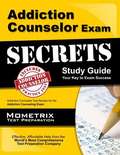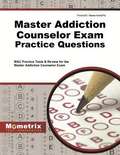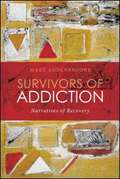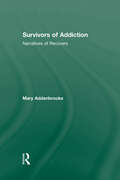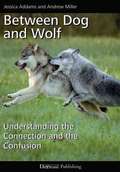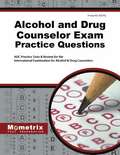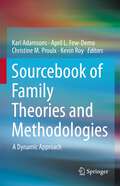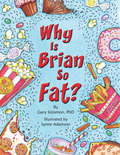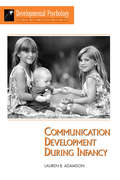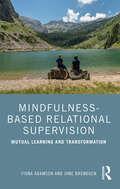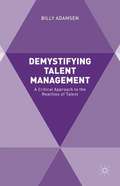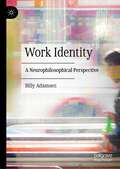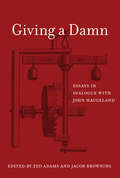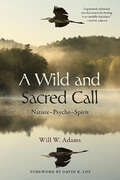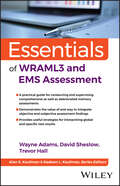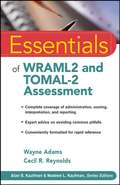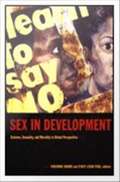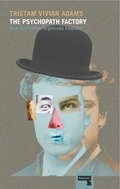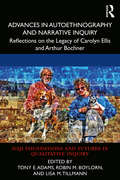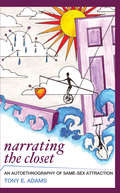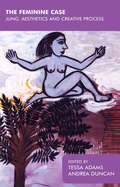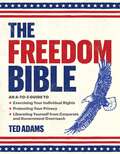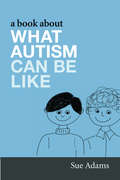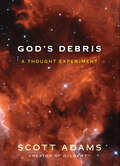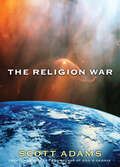- Table View
- List View
Addiction Counselor Exam Secrets Study Guide: Addiction Counselor Test Review For The Addiction Counseling Exam
by Addiction Counselor Exam Secrets Test Prep StaffAddiction Counselor Exam Secrets helps you ace the Addiction Counseling Exam, without weeks and months of endless studying. <P><P>Our comprehensive Addiction Counselor Exam Secrets study guide is written by our exam experts, who painstakingly researched every topic and concept that you need to know to ace your test.
Master Addiction Counselor Exam Practice Questions: Mac Practice Tests And Review For The Master Addiction Counselor Exam
by Addiction Counselor Exam Secrets Test Prep StaffMaster Addiction Counselor Exam Practice Questions are the simplest way to prepare for the Master Addiction Counselor test. Practice is an essential part of preparing for a test and improving a test taker's chance of success. The best way to practice taking a test is by going through lots of practice test questions. If someone has never taken a practice test, then they are unprepared for the types of questions and answer choices that they will encounter on the official test. There is a tremendous advantage to someone taking the test that is already familiar with the questions and answer choices. Another advantage of taking practice tests is that you can assess your performance and see if you need to study and practice more, or if you're already prepared enough to achieve success on your test day. If you do well on the practice test, then you know you're prepared. If you struggle on the practice test, then you know you may still have more work to do to get prepared. Taking lots of practice tests helps ensure that you are not surprised or disappointed on your test day. Our Master Addiction Counselor Exam Practice Questions give you the opportunity to test your knowledge on a set of questions. You can know everything that is going to be covered on the test and it will not do you any good on test day if you have not had a chance to practice. Repetition is a key to success and using practice test questions allows you to reinforce your strengths and improve your weaknesses. Detailed answer explanations are also included for each question. It may sound obvious, but you have to know which questions you missed (and more importantly why you missed them) to be able to avoid making the same mistakes again when you take the real test. That's why our Master Addiction Counselor Exam Practice Questions include answer keys with detailed answer explanations. These in-depth answer explanations will allow you to better understand any questions that were difficult for you or that you needed more help to understand.
Survivors Of Addiction: Narratives Of Recovery
by Mary AddenbrookeAddiction is something that affects many different people from all walks of life and can be difficult for a therapist to treat, and the client to conquer. In this book fifteen people who have formerly had serious addictions speak about their experiences. Survivors of Addiction draws on first-hand narratives to provide an overview of how and why people become addicted, and explores what happens after the addiction is left behind. Divided into four sections it covers: being caught up in addiction how and why users stop being addicted the early days after surviving addiction long-term outcomes. By considering psychodynamic and Jungian perspectives as well as the clinical vignettes, this book examines the process of recovery from addiction. It will be key reading for therapists, clinicians and healthcare workers who encounter addictions in their day to day professions and will also be of great interest to those who are, or have been addicted, and their families.
Survivors of Addiction: Narratives of Recovery
by Mary AddenbrookeAddiction is something that affects many different people from all walks of life and can be difficult for a therapist to treat, and the client to conquer. In this book fifteen people who have formerly had serious addictions speak about their experiences. Survivors of Addiction draws on first-hand narratives to provide an overview of how and why people become addicted, and explores what happens after the addiction is left behind. Divided into four sections it covers: being caught up in addiction how and why users stop being addicted the early days after surviving addiction long-term outcomes. By considering psychodynamic and Jungian perspectives as well as the clinical vignettes, this book examines the process of recovery from addiction. It will be key reading for therapists, clinicians and healthcare workers who encounter addictions in their day to day professions and will also be of great interest to those who are, or have been addicted, and their families.
Between Dog and Wolf: Understanding the Connection and the Confusion
by Jessica Addams Andrew MillerMost scientists now agree that the dog is a subspecies of wolf-Canis lupus familiaris. And while most wolves look and act differently from most dogs, it can be very hard to make accurate identifications, especially since wolves and dogs can and do interbreed and certain breeds of dogs look and act a lot like wolves. Having spent years employed at Wolf Park, in Indiana, authors Jessica Addams and Andrew Miller have encountered hundreds of so-called wolves that turned out to be dogs, hybrids that exhibit the characteristics of both wolves and dogs, and even pure wolves that act like dogs. Between Dog and Wolf takes a fascinating look at how wolves and dogs are related, why they can be so hard to tell apart and what rescue organizations need to know when they encounter a canine of unknown origins.
Alcohol and Drug Counselor Exam Practice Questions: ADC Practice Tests and Review of the International Examination for Alcohol and Drug Counselors
by ADC Exam Secrets Test Prep Staff<p>Alcohol and Drug Counselor Exam Practice Questions are the simplest way to prepare for the Alcohol and Drug Counselor test. Practice is an essential part of preparing for a test and improving a test taker's chance of success. The best way to practice taking a test is by going through lots of Alcohol and Drug Counselor practice questions. <p>Our Alcohol and Drug Counselor Exam Practice Questions give you the opportunity to test your knowledge on a set of questions. You could know everything that is going to be covered on the test but still perform poorly if you have not had a chance to practice. Repetition is a key to success and using Alcohol and Drug Counselor practice test questions allows you to reinforce your strengths and improve your weaknesses. <p>Detailed answer explanations are also included for each question. It may sound obvious, but you have to know which questions you missed (and more importantly why you missed them) to be able to avoid making the same mistakes again when you take the real test. That's why our Alcohol and Drug Counselor Exam Practice Questions include answer keys with detailed answer explanations. These in-depth answer explanations will allow you to better understand any Alcohol and Drug Counselor questions that were difficult for you or that you needed more help to understand.</p>
Sourcebook of Family Theories and Methodologies: A Dynamic Approach
by Kari Adamsons April L. Few-Demo Christine M. Proulx Kevin RoyThis sourcebook is an unparalleled resource in the field of family science. It provides a comprehensive overview of both traditional and contemporary theories and methodologies to promote a greater understanding of increasingly complex family realities. It focuses on broad developments in research design and conceptualization, while also offering a historical perspective on developments in family science over time, particularly emerging theories from the past several decades. Each chapter summarizes and evaluates a major theory or methodological approach in the field, delving into its main principles; its debates and challenges; how it has evolved over time; its practical uses in policy, education, or further research; and links to other theories and methodologies. In highlighting recent research of note, chapters emphasize the potential for innovative future applications.Key areas of coverage include:· Risk and resilience, family stress, feminist, critical race, and social exchange theories.· Ambiguous loss, intersectionality, Queer, and family development theory.· Life course framework.· Biosocial theory and biomarker methods.· Symbolic interactionism.· Ethnography.· Mixed methods, participatory action research, and evaluation.
Why Is Brian So Fat?
by Lynne Adamson Ph.D. Gary SolomonA poignant story of Brian, a twelve-year-old boy who eats instead of feeling to avoid the reality of living with his dysfunctional family.
Communication Development During Infancy
by Lauren B AdamsonThis book considers communication development during the first 18 months of life of infants and summarizes the extensive literature about early parent—infant interactions. It is intended for professionals in speech language pathology and pediatrics.
Mindfulness-Based Relational Supervision: Mutual Learning and Transformation
by Fiona Adamson Jane BrendgenMindfulness-Based Relational Supervision explores a relational and mindfulness-based approach to adult learning and development that is mutually transformational. The initial focus of the book is a case study that shows the evolution of a dialogical supervision relationship that was transformational for both parties. The authors present their reflections and analysis of key transformational moments that brought insights which significantly enhanced their personal and professional development. The authors adopt an interdisciplinary approach, discussing relational neurobiology and relational mindfulness practice together with ideas from child and adult development, attachment theory, intersubjectivity, somatic experiencing, and adult learning theories. The case study narrative charts the development of the authors’ supervision relationship, following which they share a meta-perspective on their learning journey. Finally, they discuss the implications of the study for the education and training of relational practitioners in supervision, coaching, and related fields. The book will appeal to students, practitioners and supervisors in the helping professions, in particular counselling, psychotherapy, and coaching.
Demystifying Talent Management: A Critical Approach To The Realities Of Talent
by Billy AdamsenDemystifying Talent Management questions the explanation of talent, that anyone who has 'more' has a talent, and demonstrates how the term 'talent' has become an empty signifier. The book asks if talent exists at all, and reflects on what the consequences for talent management within business and sports would be if this were the case.
Work Identity: A Neurophilosophical Perspective
by Billy AdamsenAt present, 80% of the employees are no longer engaged in their work and capable of performing, while 44% are experiencing work related stress and getting sick from working. A significant increase in time spent on interpretation at work trying to understand what managers and colleagues are saying has been observed too. This book offers a critical view on vocational inventory tests and the development of the work language and the use of it describing work identity. As well as a neurophilosophical perspective on self and work identity, this book provides a plausible neurophilosophical explanation for the negative impact of losing work identity on our work behavior, well-being, and success. Furthermore, the author introduces the innovative Work Identity Pro, the first work identity test to independently measure work identity. It will be of great interest to scholars and students of human resources management, organisation studies and organisational psychology. It will also be of interest to managers and those with an interest in work identity, behaviour and well-being.
Giving a Damn: Essays in Dialogue with John Haugeland (The\mit Press Ser.)
by Zed Adams Jacob BrowningA collection of essays that use John Haugeland's work on intentionality, embodiment, objectivity, and caring to explore contemporary issues in philosophy of mind.In his work, the philosopher John Haugeland (1945–2010) proposed a radical expansion of philosophy's conceptual toolkit, calling for a wider range of resources for understanding the mind, the world, and how they relate. Haugeland argued that “giving a damn” is essential for having a mind—suggesting that traditional approaches to cognitive science mistakenly overlook the relevance of caring to the understanding of mindedness. Haugeland's determination to expand philosophy's array of concepts led him to write on a wide variety of subjects that may seem unrelated—from topics in cognitive science and philosophy of mind to examinations of such figures as Martin Heidegger and Thomas Kuhn. Haugeland's two books with the MIT Press, Artificial Intelligence and Mind Design, show the range of his interests.This book offers a collection of essays in conversation with Haugeland's work. The essays, by prominent scholars, extend Haugeland's work on a range of contemporary topics in philosophy of mind—from questions about intentionality to issues concerning objectivity and truth to the work of Heidegger. Giving a Damn also includes a previously unpublished paper by Haugeland, “Two Dogmas of Rationalism,” as well as critical responses to it. Finally, an appendix offers Haugeland's outline of Kant's "Transcendental Deduction of the Categories.” ContributorsZed Adams, William Blattner, Jacob Browning, Steven Crowell, John Haugeland, Bennett W. Helm, Rebecca Kukla, John Kulvicki, Mark Lance, Danielle Macbeth, Chauncey Maher, John McDowell, Joseph Rouse
A Wild and Sacred Call: Nature–Psyche–Spirit (SUNY series in Transpersonal and Humanistic Psychology)
by Will W. AdamsOur current ecological derangement is not only a biological crisis but more deeply a crisis of consciousness, culture, and relationship. The core ethical responsibility of our contemporary era, therefore, and the aspiration of this ecopsychological/ecospiritual book, is to create a mutually enhancing relationship between humankind and the rest of nature. To address the urgent concerns of global warming, mass extinction, toxic environments, and our loss of conscious contact with the natural world, psychologist Will W. Adams weaves together insights from Zen Buddhism, Christian mysticism, phenomenology, psychoanalysis, and the practice of psychotherapy. Through a transpersonal, nondual, contemplative approach, Adams explores the fundamental malady of supposed separation (or dissociation): mind over body, self over others, my tribe over others', humans over the rest of nature. Instead of merely discussing these crucial issues in abstract terms, the book presents healing alternatives through storytelling, poetry, and theoretical inquiry. Written in an engaging, down-to-earth manner grounded in vivid descriptions of actual lived experience, A Wild and Sacred Call speaks across disciplines to students, experts, and nonspecialists alike.
Essentials of WRAML3 and EMS Assessment (Essentials of Psychological Assessment)
by Wayne Adams David Sheslow Trevor A. HallDevelop your memory assessment expertise with WRAML3 and EMS mastery Essentials of WRAML3 and EMS Assessment allows you to dive deep into the intricacies of memory assessment and gain proficiency in making holistic, meaningful recommendations on the basis of test scores and subjective assessments. Explore the latest enhancements in the second version of WRAML, featuring a Performance Validity measure, heightened emphasis on delayed recall and working memory, more nuanced scoring, and an additional abbreviated format. This book will also help you develop expertise in administering the subjective EMS assessment tool, capturing everyday memory in addition to the more clinical information offered by the WRAML. Understand the nuances of memory assessment with visual cues highlighting crucial points Develop practical expertise with step-by-step guidelines that go beyond the official testing manuals. Gain a deeper knowledge of memory assessment with integrated theoretical and research content Enhance your own professional development or train students and colleagues in a multifaceted memory assessment approach This comprehensive guide will elevate your memory assessment skills for children and adults, ensuring your recommendations are both informed and impactful.
Essentials of WRAML2 and TOMAL-2 Assessment
by Wayne Adams Cecil R. ReynoldsEssentials of WRAML2 and TOMAL-2 Assessment introduces professionals to these two widely used memory measurement batteries, both of which measure memory and are used to supplement evaluations of ADHD and reading problems in youngsters, as well as a number of other disorders across the age span. Written by Wayne Adams and Cecil Reynolds, this essential reference provides administration guidelines, including procedural suggestions and solutions for common problems examiners may encounter; expert assessment of each test?s relative strengths and weaknesses; valuable advice on clinical applications; and illuminating case reports.
Sex in Development: Science, Sexuality, and Morality in Global Perspective
by Vincanne Adams Stacy Leigh PiggSex in Development examines how development projects around the world intended to promote population management, disease prevention, and maternal and child health intentionally and unintentionally shape ideas about what constitutes "normal" sexual practices and identities. From sex education in Uganda to aids prevention in India to family planning in Greece, various sites of development work related to sex, sexuality, and reproduction are examined in the rich, ethnographically grounded essays in this volume. These essays demonstrate that ideas related to morality are repeatedly enacted in ostensibly value-neutral efforts to put into practice a "global" agenda reflecting the latest medical science. Sex in Development combines the cultural analysis of sexuality, critiques of global development, and science and technology studies. Whether considering the resistance encountered by representatives of an American pharmaceutical company attempting to teach Russian doctors a "value free" way to offer patients birth control or the tension between Tibetan Buddhist ideas of fertility and the modernization schemes of the Chinese government, these essays show that attempts to make sex a universal moral object to be managed and controlled leave a host of moral ambiguities in their wake as they are engaged, resisted, and reinvented in different ways throughout the world. Contributors. Vincanne Adams, Leslie Butt, Lawrence Cohen, Heather Dell, Vinh-Kim Nguyen, Shanti Parikh, Heather Paxson, Stacy Leigh Pigg, Michele Rivkin-Fish
The Psychopath Factory: How Capitalism Organizes Empathy
by Tristam AdamsThe Psychopath Factory: How Capitalism Organizes Empathy examines how the requirements, stimuli, affects and environments of work condition our empathy. In some cases, work calls for no empathy - characters who don't blink or flinch in the face of danger nor crack under pressure. In other cases, capitalism requires empathy in spades -charming, friendly, sensitive and listening managers, customer service agents and careers. When workers are required to either ignore their empathy to-do a job, or dial it up to increase productivity, they are entering a psychopathic modality. The affective blitz of work, flickering screens, emotive content, vibrating alerts and sounding alarms erode our sensitivities whilst we are modulated with attention stimulants, social lubricants and so called anti-anxiety drugs. This is amidst a virulent and exacerbating climate of competition and frenzied quantification. Capitalism pressures us to feign empathy and leverage social relationships on one hand, whilst being cold and pragmatic on the other. We are passionate and enthusiastic whilst keeping a professional distance. Sympathy, care, compassion and altruism are important; The Psychopath Factory: How Capitalism Organizes Empathy argues that itis a mistake to presuppose that empathy can achieve these. Rather than being subject to the late capitalist organization of our empathy, psychopathy could be a means of escape.
Advances in Autoethnography and Narrative Inquiry: Reflections on the Legacy of Carolyn Ellis and Arthur Bochner (International Congress of Qualitative Inquiry (ICQI) Foundations and Futures in Qualitative Inquiry)
by Tony E. AdamsAdvances in Autoethnography and Narrative Inquiry pays homage to two prominent scholars, Arthur Bochner and Carolyn Ellis, for their formative and formidable contributions to autoethnography, personal narrative, and alternative forms of scholarship. Their autoethnographic—and life—project gives us tools for understanding shared humanity and precious diversity; for striving to become ever-more empathic, loving, and ethical; and for living our best creative, relational, and public lives. The collection is organized into two sections: "Foundations" and "Futures." Contributors to "Foundations" explore Carolyn and Art’s scholarship and legacy and/or their singular presence in the author’s life. Contributors to "Futures" offer novel and innovative applications of autoethnographic and narrative inquiry. Throughout, contributors demonstrate how Bochner’s and Ellis’ work has created and shifted the terrain of autoethnographic and narrative research. This collection will be of interest to researchers familiar with Bochner’s and Ellis’ research. It also serves as a resource for graduate students, scholars, and professionals who have an interest in autoethnographic and narrative research. This collection can be used in upper-division undergraduate courses and graduate courses solely about autoethnography and narrative, and as a secondary text for courses about ethnography and qualitative research.
Narrating the Closet: An Autoethnography of Same-Sex Attraction (Writing Lives: Ethnographic Narratives)
by Tony E AdamsMotivated by the death of his partner, Adams seeks to redefine the closet as a relational construct between all people and all sexualities. The closet is explored at each stage—entering it, inhabiting it, and coming out of it—and strategies are offered for reframing difficult closet experiences. Adams makes use of interviews, personal narratives, and autoethnography to analyze lived, relational experiences of sexuality. This is a must have for scholars and students of gender studies, qualitative research, and for any reader who has felt the closet’s reach.
The Feminine Case: Jung, Aesthetics and Creative Process
by Tessa Adams Andrea DuncanThe Feminine Case is a collection of papers that debate the issue of gender from a Jungian perspective. Particular attention is paid to the discussion of Jung's "transcendent function" and what this offers women in the process of individualisation. Attention is also given to the revisionist work of James Hillman and to relevant issues found within post-Lacanian critique, principally in the works of Julia Kristeva, Luce Irigaray and Helene Cixous. The chapters deal with a range of issues and aim to promote further discussion. One theme discussed in the book is the way in which feminine language is formed within a masculine domain and how it can and is changing. Works of literature, notably those of Charlotte Bronte and The Tempest, are explored and examined in conjunction with Jungian themes. The feminine in relation to the maternal, and in its lack of relation to the divine, are two other engaging topics discussed in this volume. This collection involves the reader in a welcome debate on the role of the feminine in the Jungian world.
The Freedom Bible: An A-to-Z Guide to Exercising Your Individual Rights, Protecting Your Privacy, Liberating Yourself from Corporate and Government Overreach
by Ted AdamsLearn How to Protect Your Family&’s Freedom!Freedom is the foundation on which America was born and continues to thrive. If you believe in the strength of freedom as more than an ideal, you can find smart ways to exercise it in all parts of your life! The Freedom Bible is your A-to-Z guide to knowing your individual rights and seeking more control and freedom through the decisions you face every day.Own healthcare decisions for you and your familyMake choices that direct your dollars where you want—for example, made in America, not overseasKnow your options to challenge governing boards—from home ownership associations to school boardsReduce your reliance on &“the grid&”Escape the invasiveness of all kinds of technologyGuard your privacy and free speech on social mediaAnd much more!Get freedom from…· Big Government· Big Tech· Dependence on Overseas Goods· Employer &“Requirements&”· HOAs· Social media jail· Spam callers· Taxes· And More!
A Book About What Autism Can Be Like
by Sue Adams Donna WilliamsChris and Andrew are very good friends, but sometimes Chris does things that Andrew doesn't understand. Chris can hear a fly buzzing when it's a mile away! But he doesn't like bright flashing lights like the ones on Andrew's favourite arcade game. Chris and Andrew have lots of fun together, but at times they laugh at completely different things - it doesn't matter though, because everyone is different, and being different can be rather cool! Chris and Andrew are here to help people understand the experiences of a child with autism, and how others can help by understanding how they are different, and recognising their many unique talents. This fully-illustrated book is targeted at boys and girls aged 5+, and also serves as an excellent starting point for family and classroom discussions.
God's Debris: A Thought Experiment
by Scott AdamsGod's Debris is the first non-Dilbert, non-humor book by best-selling author Scott Adams. Adams describes God's Debris as a thought experiment wrapped in a story. It's designed to make your brain spin around inside your skull.Imagine that you meet a very old man who—you eventually realize—knows literally everything. Imagine that he explains for you the great mysteries of life: quantum physics, evolution, God, gravity, light psychic phenomenon, and probability—in a way so simple, so novel, and so compelling that it all fits together and makes perfect sense. What does it feel like to suddenly understand everything?You may not find the final answer to the big question, but God's Debris might provide the most compelling vision of reality you will ever read. The thought experiment is this: Try to figure out what's wrong with the old man's explanation of reality. Share the book with your smart friends, then discuss it later while enjoying a beverage.It has no violence or sex, but the ideas are powerful and not appropriate for readers under fourteen.
The Religion War
by Scott AdamsIn this frenetically paced sequel to Adams' best-selling "thought experiment," God's Debris, the smartest man in the world is on a mission to stop a cataclysmic war between Christian and Muslim forces and save civilization. The brilliantly crafted, thought-provoking fable raises questions about the nature of reality and just where our delusions are taking us.With publication of The Religion War, millions of long-time fans of Scott Adams' Dilbert cartoons and business bestsellers will have to admit that the literary world is a better place with Adams on the loose spreading new ideas and philosophical conundrums.Unlike God's Debris, which was principally a dialogue between its two main characters, The Religion War is set several decades in the future when the smartest man in the world steps between international leaders to prevent a catastrophic confrontation between Christianiy and Islam. The parallels between where we are today and where we could be in the near future are clear.According to Adams, The Religion War targets "bright readers with short attention spans-everyone from lazy students to busy book clubs." But while the book may be a three-hour read, it's packed with concepts that will be discussed long after, including a list of "Questions to Ponder in the Shower" that reinforce the story's purpose of highlighting the most important-yet most ignored-questions in the world.
